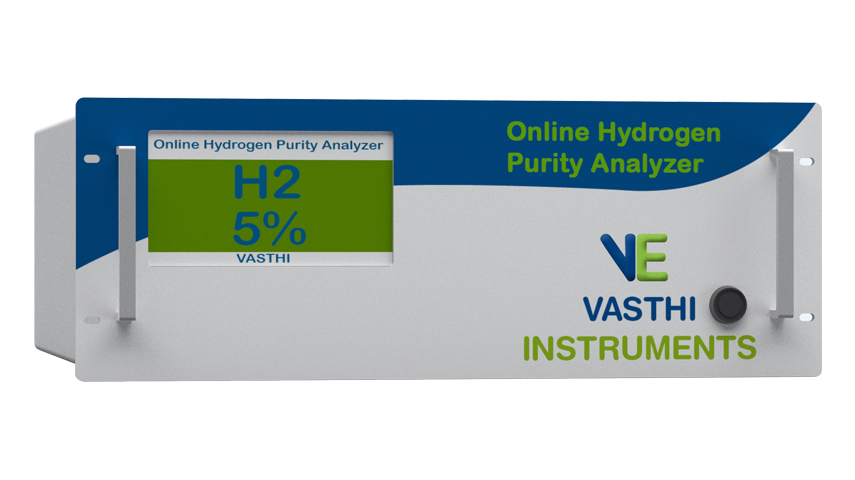Tri-Gas Analyzer / Hydrogen Purity Gas Analyzer
Tri-Gas Analyzer / Hydrogen Purity Gas Analyzer
Hydrogen Purity Analyzer uses sensors based on a reliable and stable thermal conductivity concept that provides high sensitivity and accurate analysis of two-phase gases. The Tri-Gas Analyzer Is Specifically Designed For Monitoring H2 Purity In The H2 Feed To A Power Generator And To Monitor The Purging Procedure During Shutdown. Portable Hydrogen Purity Analyzers (VHP-200) are intelligent gas analyzers for measuring gas based on the measurement of the thermal conductivity of the ambient gas. To compensate for the influence of temperature and humidity, these are measured separately, and a correction is made for them in the microcontroller.
Online Hydrogen Purity Analyzer
Online Hydrogen Purity Analyzer uses sensors based... Read More
Portable Hydrogen Purity / Tri -Gas Analyzer
Portable Hydrogen Purityanalyzers are microprocess... Read More
Hydrogen purity analyzer
A hydrogen purity analyzer is a device used to test the purity of hydrogen gas. The analyzer typically consists of a gas chromatograph or mass spectrometer, which is used to measure the number of impurities in the gas. The purity of hydrogen is important for many industrial applications, such as fuel cells and semiconductor manufacturing.
One of the most common impurities in hydrogen is carbon monoxide (CO). CO can poison fuel cells and cause semiconductor defects. Therefore, it is important to remove CO from hydrogen gas before it is used in these applications. The hydrogen purity analyzer can help to identify the level of CO in the gas, so that the gas can be treated accordingly.
Another common impurity in hydrogen is water vapor (H2O). Although H2O is not poisonous like CO, it can still cause problems in fuel cells and semiconductor manufacturing. For example, H2O can react with the electrodes in fuel cells, causing them to corrode.
When it comes to industrial and research applications, hydrogen is often used as a fuel or as an element in chemical reactions. In order to ensure that the hydrogen being used is of the highest quality, a hydrogen purity analyzer is often employed. This article will provide an overview of how these devices work and their applications.
Hydrogen purity gas analyzer
A hydrogen purity gas analyzer is a great way to keep track of the purity of your hydrogen gas. This blog will show you how to use one and what to look for when choosing a gas analyzer.
A hydrogen purity gas analyzer is a tool that measures the percentage of hydrogen in a sample of gas. The most common type of hydrogen purity gas analyzer is the H2O2 sensor, which uses a chemical reaction to measure the amount of hydrogen in the gas.
There are many different brands and models of hydrogen purity gas analyzers on the market, so it is important to do your research before purchasing one. You will want to consider factors such as accuracy, range, and price when making your decision.
Once you have purchased your hydrogen purity gas analyzer, using it is relatively simple. First, turn on the power switch and allow the unit to warm up for about 5 minutes. Then, open the sample valve and allow a sample of gas to flow into the unit. After about 30 seconds, the display will show the percentage of hydrogen in the sample.
It is important to regularly check the accuracy of your hydrogen purity gas analyzer by calibration with a known standard. Most units come
H2 purity analyzer
A hydrogen purity analyzer is a device that is used to measure the purity of hydrogen gas. The device typically consists of a sensor that is placed in the gas stream, and a readout that displays the purity level. The analyzer may also have a alarm that is triggered when the purity level falls below a certain level.
Tri gas analyzer
A hydrogen purity analyzer is a device that is used to measure the purity of hydrogen gas. The analyzer can be used to measure the concentration of impurities in the gas, as well as the amount of moisture and oxygen in the gas. The device is often used in industries where hydrogen gas is used, such as in the semiconductor industry, in order to ensure that the gas is of high quality.




.webp)
.webp)

.webp)

.webp)




.webp)

.webp)









